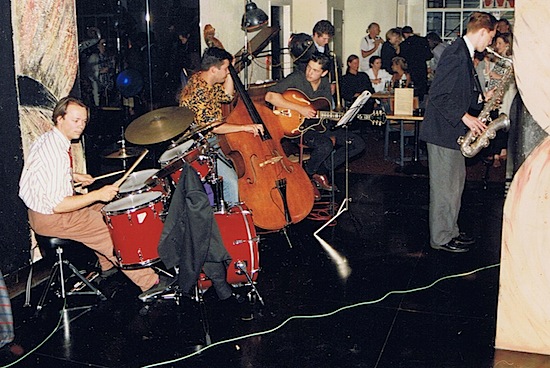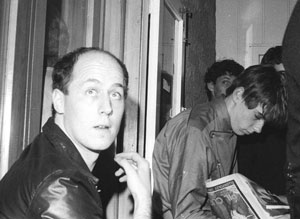As far as I know this is the only shot of Freebass playing at Cause Celebre, or for that matter anywhere. 
The Take Me Back gig has forced me to dig around a few old boxes of bits and pieces and I've found all sorts of stuff that I'd either forgotten or thought I'd lost. One of which was the one-off Karen Walker Box jacket whcih I wore last Saturday night and could've sold a dozen times or more. I mused about Trade Me-ing it but wiser voices told me to think better of it, so I'll hang on to it.
But this photo really jogged my ongoing paranoia that we are, in New Zealand at least, slowly losing so much of our musical heritage, even relatively recent stuff like the Freebass album I profiled a few weeks back here.
The disappearance of the the Flying Nun catalogue is one thing. It's mostly no longer available in any format, physical or digital but the reality is that it likely will appear again at some stage, once Roger's purchase of FN becomes a fact, or somehow someone knuckles down to sort it.
It has that sort of cultural momentum.
That's great, but history has largely rewritten, or been rewritten to exclude the other 95% of New Zealand audio releases from the pre-digital era which is a huge crime.
Just looking at the era I'm rather involved with, from about 1977 through to the the current day, although narrowing that down to the pre-1995 part of that span, there was a vast body of NZ music recorded for labels that were not Flying Nun, and it's not unfair to say that after about 1987 FN was rather conservative in it's outlook and that many acts moved mountains to distance themselves from the "Flying Nun Band" tag. In the North Island at least the most innovative music from that era, and most needing preservation in 2009, or in danger of forever disappearing into the abyss appeared on labels like Pagan, Deep Grooves, Southside or on a raft of smaller indies and artist owned labels.
Sure large slabs of popular music are being archived in places like the Sound Archive in Christchurch, but unlike Australia, Canada, the UK, or just about any developed country, where efforts are successfully made to keep much of what has been recorded available to the public via reissues, digital and so on, much of what was released in New Zealand, no make that most, looks likely to disappear into the abyss in the not too distant future. And the Sound Archive is focused primarily on radio and Maori archiving, rather than the history of our recorded music, thus they don't always know what things are, or what they need to prioritize. An attempt to initiate a focused recordings and master tape archive was rather ruthlessly shot down by the last Labour Government.
It rather feels like time is running out for a lot of stuff, and there is much which has already gone from the pre-77 era, which, given the disbursement and passing of many of those involved, it probably is, so I guess a large part of our musical heritage in NZ will quietly slip into the past forever in the years to come.






10 comments:
Okay, so there isn't a government agency that is willing to come to the party. Do you think it could be achieved by a large enough group of people using a social network? (I know that would be issues around the legal status of such a repository, but we can get to that later - do you think it's an idea that could work or take hold?)
I think a bit more than that is needed. A proper recording archive is probably overdue where both physical and digital can reside.
Another huge part of the problem is disapperaing masters. Tapes disintegrate and digital disappears into that place where hard drives (and back-ups too) go to die.
So... shouldn't somebody do something? I'm not completely ignorant of the parameters of proper preservation, but isn't a digitisation effort by enthusiasts better than the certainty of oblivion? Unless you think there's somebody to lobby in government or in the sector.
Yep, agreed, hence my post, hoping that it gives it all a little push along. I'm not in the country 90% of the time so largely it's a physical impossibility for me to scour the bins or drive the physical side..remembering that the bulk of what we're talking about doesn't exist in any digital format yet and will need to be physically transferred. It's project that could easily take a team several lifetimes, but there are people like Robbery who are actually doing their own bit towards preservation.
I guess, though, I'm angling more for a proper recorded music archive with funding and storage facilities and I'd rather see it done comprehensively.
Hell, If someone paid me, I'd even consider coming back to oversee but in these straitened times that's less than likely I guess.
I put a proposal to the government some years back but met a wall. A second proposal was net with a more robust no.
Hi Simon,
I work for DigitalNZ and we recently launched a site called Make It Digital, where people can nominate stuff that they think should be digitised and made available to the NZ public. You could post some of the ideas from this post as nominations on Make It Digital to raise awareness of the need and demand for it.
I'm also going to pass this blog post onto the music cataloguing team at the National Library.
Hi Simon,
I am a music selector for the Alexander Turnbull / National Library and just wanted to let you know that we systematically collect all releases from New Zealand musicians in multiple formats. Not only do we collect releases from the wide range of NZ labels, such as Flying Nun, Pagan, and Deep Grooves as you mentioned but we also collect independent releases. We have also recently started collecting digital music which is being placed into the National Digital Heritage Archive for safe keeping and continued access well into the future, as well as acquiring and archiving NZ musicians and bands websites, including yours I might add!
I think it’s great that people are interested in the continued preservation of New Zealand music and I would be happy to talk to anyone who has any material they think we may not have in our collections. I have a Myspace page at http://www.myspace.com/nzmusicselector or you can email me at Sholto.Duncan@natlib.govt.nz if you want to get in touch. Also feel free to check out our online catalogue at http://www.natlib.govt.nz/ and have a look at what we have, I’m sure you will be pleasantly surprised!
Sholto
Hi Jo, thanks for you comments. I wasn't aware of the Make It Digital site, so thank you. I'll post something there shortly. My concern though is that it seems to be too wide ranging and that a focused Library / Archive dedicated just to the preservation and cataloguing of audio data, both analogue and digital with expert input allowing for a focused selection process of what is to be prioritised (a minefield in itself) along the lines of the Film Archive.
Any thoughts you have would be much welcomed.
Hi Simon,
Your post echoes my thoughts on the issue exactly. My professional view is that it isn't too late to initiate a preservation programme, but there are a number of factors that will be difficult to manage in the future. For the sake of discussion, I thought I might post a few of these here in the hope of appealing to someone who is in a position to do something.
Firstly, the recordings themselves will already be obsolete from the point of view of their custodians. Record labels, recording studios, recording artists, etc. probably don't have the facilities to play back open reel tapes and this absence of utility is sure to endanger them. This situation is exacerbated by the fact that, if there is no room 'under the bed' for them, there is nowhere else to send them: Sound Archives/Nga Taonga Korero, quite rightly, won't take anything that doesn't meet the requirements of their collection development policy, and the National Library doesn't have the resources to do anything but store the material.
Expertise is complex issue. In New Zealand, we have a very small handful of sound archivists, most of whom are inadequately trained, and probably have little experience in managing an archives programme. This is a common trend in other countries: most archives take a 'division of labour' approach to archiving, which involves employing ex-audio engineers to carry out transfers, trained archivists for curation, etc. What I mean to point out here is that there are probably only four or five people in the country who are experienced or educated enough to act as consultants for such a project. A preservation programme cannot be developed solely by enthusiasts - somebody with the right skills, energy and genuine passion will need to direct it.
Culture is also worth discussing. This archive cannot be an 'island' and its success will rely on a network of recording studios, industry bodies, artists, funders and Government each working for the greater good. If there is no collaborative culture, then the archive will be forever asking for material, which is not ideal. In most instances, the labels own the tapes (or the Pro Tools sessions) and they probably won't hand them over unless it is seen as their social responsibility. This raises the question of 'who owns the archive?'.
...
...
In addition to this, there are simpler, but equally crucial, issues that need to be mooted. For instance, where is the now-obsolete playback equipment going to come from? My feeling is that any preservation project will rely on begging and borrowing. Fortunately, it seems like goodwill is abundant.
Rights will undoubtedly be a difficult issue. We are fortunate in New Zealand: our Copyright Act allows us to make copies of copyrighted material for the purposes of preservation. However, there is little use in digitising these recordings unless stakeholders (the public, the artists, the labels, etc.) are allowed to do something with them.
I would urge anyone who is tossing around the idea of such a project to read Ray Edmondson's Audiovisual Archives: Philosophy and Principles very carefully (http://unesdoc.unesco.org/images/0013/001364/136477e.pdf). Edmondson bluntly highlights the barriers to preservation, but still manages to extol the virtues of an audiovisual heritage in a way that makes it all seem worthwhile.
We are very late to recognise the worth of musical heritage in New Zealand. EMI, for instance, has maintained a collection of every single one of its releases - the multitrack and master tapes, and an example of the released product - dating back to ~1896 (a photo, for bragging rights - http://www.facebook.com/photo.php?pid=1829156&l=3d21992cd4&id=801499783). The archive is openly referred to as EMI's greatest asset.
Like you, my hope is for a dedicated institution charged with collecting the output of New Zealand's musical heritage. It is irritating to think that the records that invigorated a generation (more than one, actually) might some day be inaccessible because the people who genuinely care about them didn't have the means to protect them.
Hello Simon
I guess I belong somewhere in this discussion as (a) I was there; and (b) I do know stuff about setting up a public service media archive.
In my experience the best way to make a start on this kind of thing is by getting the interested (and capable) parties into a room together.
Any suggestions?
Post a Comment